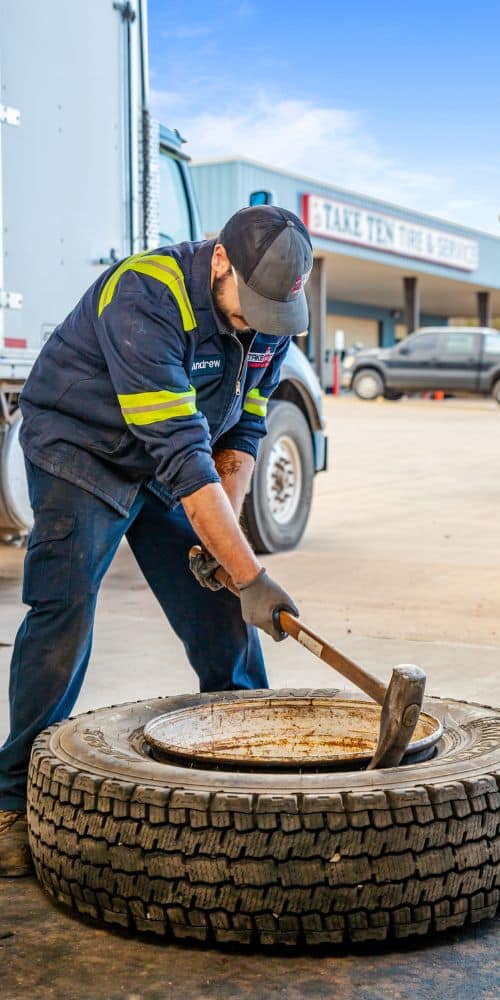Morris Tire: Exceptional Tire Solutions for All Automobiles
Morris Tire: Exceptional Tire Solutions for All Automobiles
Blog Article
The Link In Between Tire Solution and Fuel Efficiency
Effectiveness in fuel intake is a paramount worry for vehicle owners seeking to enhance their driving experience. Amongst the various variables that influence fuel efficiency, tire service stands apart as an important component that frequently goes forgotten. The intricate partnership in between tire upkeep and gas economy is a testimony to the detailed operations of a vehicle. By recognizing exactly how tire care directly influences the performance of your vehicle, you can unlock a world of opportunities that not just improve performance yet likewise add to cost financial savings in the long run.
Significance of Appropriate Tire Rising Cost Of Living
Proper tire inflation is an important aspect in optimizing fuel efficiency and guaranteeing ideal automobile efficiency. When tires are underinflated, it develops extra rolling resistance, causing the engine to work more challenging and burn more fuel to keep the same speed. On the various other hand, overinflated tires can cause a harsher experience, uneven tire wear, and lowered traction. To locate the recommended tire pressure for your lorry, describe the proprietor's manual or the sticker located on the driver's side door jamb.
Keeping the appropriate tire stress not just enhances gas effectiveness but also enhances driving safety. Effectively inflated tires provide much better handling, braking, and total efficiency when driving. Additionally, they add to extending the life expectancy of the tires, saving you cash in the future by minimizing the regularity of substitutes. Routinely checking and adjusting tire pressure, particularly soon journeys, is a straightforward yet efficient way to enhance your automobile's fuel economic situation and make sure a smooth driving experience.
Effect of Tire Footstep Deepness
Preserving the suggested tire stress is necessary for ideal car performance and fuel performance; likewise, the tread deepness of your tires plays an important function in making certain security and traction on the roadway. Tire step deepness straight affects the capability of your tires to grip the road surface, especially in wet or unsafe problems. Regularly examining your tire step deepness and replacing tires when essential is a basic yet efficient way to promote both safety and gas performance on the roadway.
Role of Wheel Alignment in Efficiency
Making certain exact wheel alignment is vital for optimizing vehicle performance and taking full advantage of fuel economy. Correct wheel positioning includes adjusting the angles of the wheels to maker specs, guaranteeing that they are identical to each various other and vertical to the ground. When wheels are misaligned, it can result in unequal tire wear, enhanced moving resistance, and reduced gas efficiency.

Additionally, precise wheel placement can likewise enhance taking care of and stability, minimizing the amount of power required to maneuver the car (morris tire). By decreasing unneeded friction and drag, proper wheel alignment plays an essential role in enhancing general car performance and fuel economic climate. Normal wheel alignment checks and changes are essential for keeping optimal efficiency and maximizing fuel financial savings
Connection Between Tire Upkeep and MPG
A vital element of maximizing gas effectiveness in vehicles is the upkeep of tires and their direct influence on miles per gallon (MPG) Correct tire maintenance plays a crucial role in taking full advantage of gas economic climate. One crucial element affecting MPG is tire stress. Underinflated tires boost rolling resistance, creating the engine to work harder and shed even more gas. On the other hand, overinflated tires lower the contact spot with the roadway, leading to irregular wear and reduced fuel effectiveness. Routinely inspecting and keeping the appropriate tire pressure can significantly enhance MPG.
Moreover, tire step deepness additionally influences fuel efficiency. Worn-out her response treads minimize traction, particularly in damp conditions, compeling the engine to exert more power to maintain speed. This enhanced resistance cause higher fuel usage. By making certain tires have sufficient step resource deepness, drivers can enhance both safety and security and gas economic situation.
Essentially, correct tire maintenance, consisting of surveillance tire pressure and walk deepness, is straight connected to accomplishing optimal MPG. By integrating regular tire examinations and upkeep into a car treatment regimen, drivers can not just extend tire life yet likewise enhance gas efficiency, eventually saving money and reducing environmental influence.

Tips for Fuel-Efficient Tire Treatment
Provided the critical partnership in between tire upkeep and gas performance, carrying out reliable approaches for maximizing tire treatment is essential to improving general vehicle efficiency. To make sure fuel-efficient tire care, routine tire pressure checks are essential. Correctly filled with air tires lower rolling resistance, boosting gas effectiveness and expanding tire life expectancy. Additionally, keeping appropriate wheel positioning and harmonizing assists disperse weight equally, avoiding unequal tire wear and maximizing fuel intake. Turning tires at recommended intervals promotes even step wear, improving fuel performance by guaranteeing all tires contribute equally to car performance. It is likewise crucial to check tires for indications of damage, such as cuts, leaks, or bulges, as these issues can impact fuel performance and overall security. Lastly, selecting tires with low moving resistance can significantly boost gas economic climate. By integrating these fuel-efficient tire treatment tips into a regular maintenance timetable, vehicle drivers can make the most of fuel efficiency, decrease operating prices, and lengthen the life of their tires.
Final Thought
Finally, proper tire service plays an essential function in fuel performance. Preserving right tire inflation, monitoring walk depth, and making sure wheel positioning can all add to optimizing visit this web-site miles per gallon. By routinely keeping tires and complying with fuel-efficient tire treatment ideas, vehicle drivers can maximize their car's performance and lower gas consumption. It is vital to focus on tire maintenance to not only conserve money on gas prices but likewise to advertise general lorry effectiveness.
Report this page